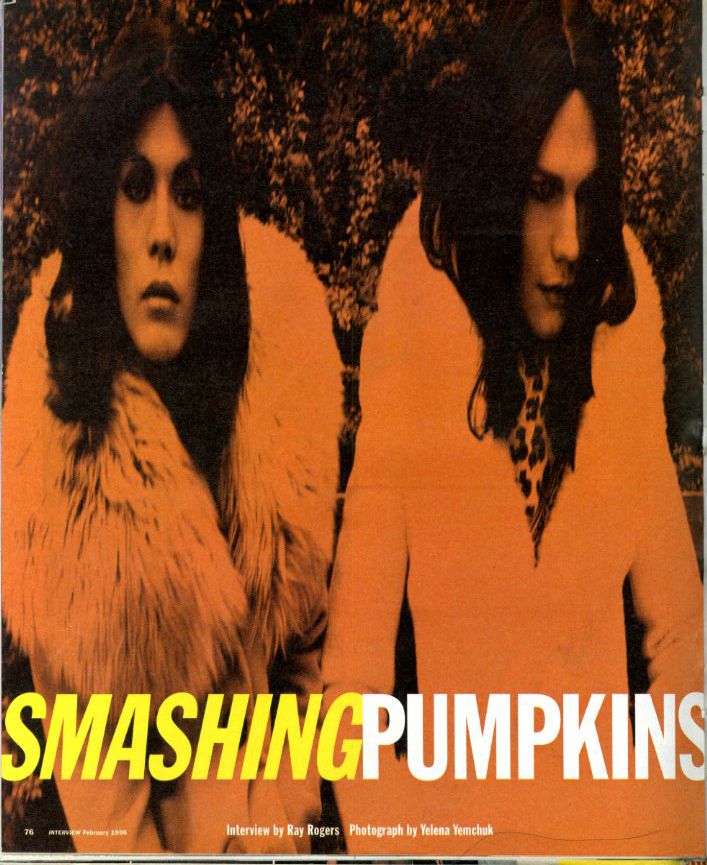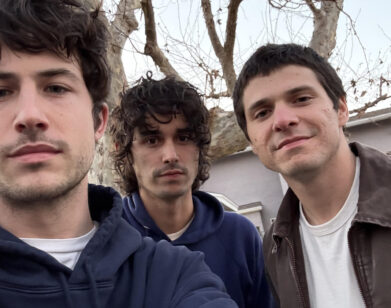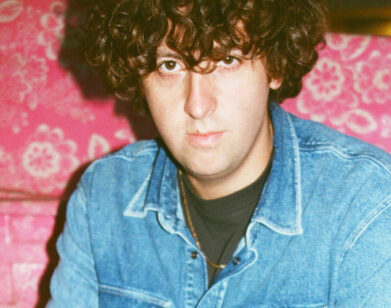New Again: Smashing Pumpkins

ABOVE: JAMES IHA (LEFT) AND BILL CORGAN (RIGHT).
In an interview published in our February 1996 issue, music critic Ray Rogers asked musician Billy Corgan, the front man of The Smashing Pumpkins, what his agenda was. “To rock the world,” he confidently answered. On December 9, Corgan continues this pursuit with the release of The Smashing Pumpkins’ 10th studio record, Monuments to an Elegy. Corgan remains the only consistent member of the seminal ’90s alt-rock band, as it gradually dissipated following the release of Mellon Collie and the Infinite Sadness in 1996. The band witnessed a sporadic flux of members, seeing people like Jimmy Chamberlin and Mike Byrne come and go. Monuments to an Elegy continues the changing roster and features Tommy Lee of Mötley Crüe on drums. In 2015, we can expect yet another album, Day For Night. –Christina Tiches
Smashing Pumpkins
By Ray Rogers
When we approached the Smashing Pumpkins about doing this story, bandleader Billy Corgan himself called up to ask why Interview was interested in his band, declaring authoritatively that “Interview‘s only interested in the beautiful people.” This from someone who dictated what photographer and makeup artists we would employ for this shoot—not to mention bandmate James Iha’s runway swaggering for his pal, fashion designer Anna Sui. (The recently shaven-headed Corgan would later tell me that he chopped off his long mane to “de-emphasize part of [my] vanity.”) But we thought this special beauty issue was precisely the place for the Smashing Pumpkins. Often the most startling works of beauty are made by the most tortured—and occasionally the most torturous—personalities.
Nothing could have prepared me for Billy Corgan’s performance the day we met at Pumpkinland, the band’s warehouse studio in Chicago. Self-assured to the point of arrogance, the group’s singer and songwriter is one big talker. The man desperately wants to put his mark on the map—not to join the rock pantheon, but to rule it—and has clearly modeled himself after the gods of rock’s ’70s heyday—Led Zeppelin, the Rolling Stones, and Pink Floyd are all touchstones for his work. With the release last fall of Mellon Collie and the Infinite Sadness (Virgin), a whopping double scoop of classic, raging rock anthems and somber ballads, he came close to proving that he’s not all talk. Despite the fact that it feels uneven and is almost overwhelming, the double record debuted on the Billboard charts at Number One. The definitive teen album of the moment, it gives voice to the rage of all the rats in their bedroom cages across the land, to borrow from Pumpkins lyrics.
It is in this great expression that the real beauty of the band’s difficult persona lies. Whether lush or jagged, the Pumpkins’ songs are so personal that their exquisiteness lies not merely in the sequence of notes but in the listener’s own relationship to Corgan’s deep well of anguish. Though disconnected and detached in person, he is able to write songs that form a conduit straight to his audience, and with that comes a painful but undeniably beautiful kinship.
RAY ROGERS: You’ve said that [your last album] Siamese Dream was born out of a lot personal band-related crises. What was the impetus for Mellon Collie and the Infinite Sadness?
BILLY CORGAN: It was basically a big “fuck-off” to anyone who has doubted us as a band. In a positive way, I wanted to really embrace the notions of creativity, to just go as far out as we wanted to go and not get too hung up about the commercial aspects.
ROGERS: What kinds of doubts are you talking about?
CORGAN: Doubts about the band actually coming together to make a record. I wanted to squash all that like a bug.
JAMES IHA: It’s a double record–that just doesn’t happen if people aren’t together on every level.
ROGERS: Billy, you got a lot of criticism last time around for playing some of the guitar and bass parts [on Siamese Dream]. How did you react to that with this record?
CORGAN: We worked out systems by which those things wouldn’t happen this time. Nobody understands the scenario: We were under different pressures, different economic constraints. Not everybody moves as quickly as I do. James comes up with great ideas; it just takes him twice as long as it takes me. So I try not to penalize anybody for the speed at which they move.
IHA: It doesn’t really take me twice as long.
CORGAN: It’s a general comment.
ROGERS: What is the focus of your work?
CORGAN: It’s strictly band music. We’re not standing on indie credibility, we don’t have punk-rock roots, we don’t have anything political to uphold. That’s not to say that personally we don’t have those things, but we’ve always felt that the band had to be the purest thing to sit at the top of the mountain.
ROGERS: How competitive are you with other bands?
CORGAN: Not at all. The bands that we respect, we have no sense of competition with. The bands that are phonies, and have no shred of originality to them, we’re competitive in the sense that we want to fucking squash those people. But that’s not real competition.
ROGERS: That sounds very competitive to me.
CORGAN: I don’t understand. Why is that competitive?
ROGERS: “We want to squash them.” How is that not? [Iha laughs]
IHA: [shouting] We must go out there and crush them! Pull out their skulls!
CORGAN: It’s not competitive because it’s not born out of respect. So when I say I want to squash them, it’s that I want us to be so real and so good that it just makes them look like the carbon copies they are.
IHA: We put on our big helmets and get on our horses with our big lances. We’re ready to joust.
ROGERS: Are you guys the Led Zeppelin of the ’90s?
IHA: Yes.
CORGAN: …He says without pause. We’re the Jefferson Airplane.
IHA: Yeah, that’s cool.
CORGAN: But we don’t have Grace Slick. James will be playing the role of the siren. [all laugh]
ROGERS: Do you see yourselves in a tradition of rock-‘n’-roll that’s not really happening right now?
CORGAN: We are very much of our time. That’s why I wanted to put the double album out right now. Some people suggested we wait, so we didn’t have so much pressure to hurry and finish. I feel this album’s relevant today, and it may not be relevant in a year even, but it’s important in the world right now. It’s like a state address.
ROGERS: What makes it relevant right now?
CORGAN: Things are desperate, totally desperate. It’s like a mass resignation. I’m only reflecting what I see: a desperate underclass of people with no future. I’m not so far removed from my suburban leanings that I can’t relate. I talked to a lot of kids about their lives in the last two years. I got a lot of letters. There was an interesting comment in the book Generation X about how this particular generation is overeducated and lives in a world that doesn’t need its education. So you have all these people who have opinions, and there’s absolutely nothing for them to do with them.
ROGERS: Were you in that position before you started a band?
CORGAN: No, because I would never allow myself to be put in that position. But I’m seeing 15-year-olds who are trapped in this hedonistic, decadent world, and they’re looking to peers and symbolic representatives of their peer groups for answers. In searching for those answers, I felt I had none. All I can tell some 15-year-old is just believe in yourself.
ROGERS: No matter how volatile your songs get, there is always a very vulnerable core. Is there a risk in leaving yourself open like that?
CORGAN: I think that’s the difference between being a courageous artist and being bunch of bullshit. I’d rather be courageous and make great work. Obviously, I’m not feeling all of these emotions all of the time, but usually a couple of songs a night really, really hit me when we play live.
ROGERS: What’s going on in your life that makes certain songs resonate more than other?
CORGAN: I decided I didn’t want to talk about my personal life anymore.
ROGERS: How did you arrive at that decision? You talked quite openly last time around.
CORGAN: You answered your own question. [laughs]
ROGERS: Did speaking publicly belittle what you were going through?
CORGAN: Yes. Because it was turned into one-line catchphrases and sound bites. And then, even worse, people start accusing you of being phony, of trumping up situations to make yourself look a certain way. We’ve had people basically insinuate that we created the band’s problems as a media event. I’ve had people say that my childhood is a creation. We were being poignantly honest, but it turned out to be an albatross. We found out that we need to protect each other first and let the world wonder about certain things. If you open up your insides and the world pisses on them, where else are you going to retreat to? There is no space left.
ROGERS: That’s quite a visceral image. Is that really how you felt?
CORGAN: Absolutely.
ROGERS: You’ve talked in the press about feeling unwanted in your childhood. Do you still feel like a freak?
CORGAN: No, I get that brief feeling of rejection, but I think we’re all magnets. We draw our greatest fears to ourselves. Being perceived like that is a fear and it magnifies itself. Selling out a show is a great validation. It really does mean a lot, but it’s not everything. It’s not like I can carry that around in my back pocket and every time I need it, just open it up and hear all the kids scream.
ROGERS: Do you guys live to play music?
IHA: I love listening to music, I love playing music, I love making music.
CORGAN: He has LIVE TO ROCK tattooed on his ass.
IHA: I’m 27. I’ve seen a million faces, and I’ve rocked them all.
ROGERS: By creating this 28-song double record, were you responding to the the view of the band that you’re indulgent rock stars?
CORGAN: We’re trying to make great work for people. We gave a good year of our lives to makes this record. If there’s anything to prove, it’s that we’re not greedy idiots. We’ve sacrificed a lot personally, and we’re sacrificing a lot economically to make this record accessible.
ROGERS: Some bands have publicly taken you to task. What do they have against you?
CORGAN: Everybody has agendas. And most that stuff is self-serving.
ROGERS: What is your agenda?
CORGAN: To rock the world.
THIS INTERVIEW ORIGINALLY RAN IN THE FEBRUARY 1996 ISSUE OF INTERVIEW.
New Again runs every Wednesday. For more, click here.






